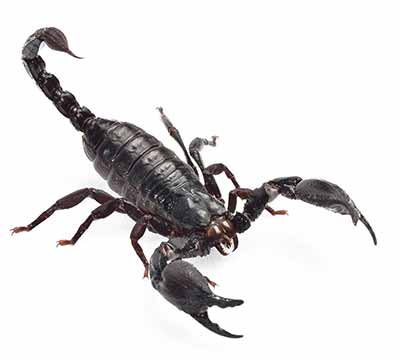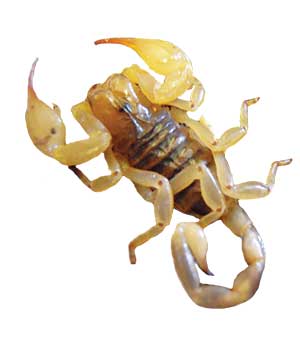Keeping Scorpions

General Information
- All Australian scorpion species are venomous, and while no known species is considered fatal please seek medical attention if stung.
- Individuals allergic to insect venom (bees, wasps etc) should exercise caution when handling and feeding their scorpion as it is highly likely they will also be allergic to scorpion venom.
- Scorpions stress when handled and are a venomous species therefore they should be an observational pet only.
- There are two main types of scorpions; burrowing species and surface-dwelling species. Please take this into account when choosing your scorpion and setting up its enclosure.
Scorpions are arachnids which are exciting and fascinating pets for those with a love of venomous creatures.

Adopting a Pet Scorpion
Species you can find at Pet City are:
- Common Species Available in Store:
- Flinder’s Range Scorpion – Urodacus elongatus
- Desert Scorpion – Urodacus yaschenkoi
- Rainforest Scorpion – Liocheles waigiensis
- Black Rock Scorpion – Urodacus manicatus
- Mottled Scorpion – Lychas marmoreus obscurus
What you'll need:
Scorpion Enclosures
The type of enclosure for most scorpions can be similar, however the substrate varies dependent on the species of the scorpion.
DO NOT house different species of scorpions together as they are highly aggressive and territorial.
Desert Species
Desert dwelling scorpions do not need a great deal of surface area as they prefer to burrow down into sand rather than roam around on the surface. Use either plastic or glass enclosures that are at least 30cm high to allow for deep substrate to bury in (at least 20cm).
A false bottom set up works best for desert scorpions as it allows for a natural simulation of their environment. A false bottom consists of a layer of gravel covering the bottom of the tank followed by a mesh layer; fly screen works well for this. Some sort of rigid tubing should be placed in one corner of the tank to allow water to be fed down to the rocks once the substrate has been added to the tank. Add at least 20cm of substrate, some bark to hide and burrow under and any fake plants of your choice. Ensure the lid is well ventilated (again fly screen is ideal for this).
Some substrates ideal for desert species are: red sand, white/red sand mixture or red sand/peat mixture.
Always ensure there is a water gradient in the tank; this can be seen in the difference in colour in the substrate. Down the bottom of the tank should be dark with moisture and the top soil should be dry. With this system no water bowl is needed.
Rainforest and Surface-Dwelling Species
Rainforest, Black Rock and Mottled scorpion species do not need a very deep substrate and do well on a 40% Red Sand - 60% Peat mixture. Ensure one end of the tank stays moist at all times (especially with the rainforest species) and mist the enclosure once a day with a spray bottle. Make sure the drier end of the enclosure is well ventilated.
Provide these scorpions with a range of hides (bark and dead native leaves work well for this) at both the moist and dry ends of the enclosure.
If you want to keep any of these species communally (one kind of scorpion per enclosure, never mix species) make sure the tank is at least 30cm long and has a range of hides. Always ensure your scorpions are well-fed. See the ‘Feeding’ section for more details.
Remove any dead food items immediately to avoid bacteria.
A false bottom system can be used for these species as well, especially the Rainforest scorpions as they enjoy a damp, humid environment. Good ventilation is always important. Spray the enclosure daily if you are not using a false bottom as it will dry out quickly, especially in the warmer months.
What Do Scorpions Eat?
Crickets are a good staple food for scorpions.
Mealworms are a good treat but be aware that they are very high in fat. Feed your live insects a good insect booster to make them more nutritious for your scorpion.
Feeding Information:
- You cannot over-feed your scorpion; however you can stress your scorpion by offering too many food items.
- Only offer one food item at a time, if it is uneaten within 24 hours remove it and try again in a day or two.
- Scorpions usually eat 2 – 3 times a week depending on their age, size and shedding cycle.
- When housing a species communally make sure there is always food available to prevent cannibalism.
Are Scorpions For Sale?
Give Pet City a call on 07 3349 2086 to see if we have any scorpions at our local Mt Gravatt store. We also sell all the equipment in-store to make sure you are prepared to own a pet scorpion. They are interesting creatures to keep as pets and you can learn a lot about them by keeping some at home.
Shop Scorpion EnclosuresDo Scorpions Need A Heat Supply?
Scorpions are cold-blooded, which means their body temperature relies on external sources, such as sunlight or a heated rock surface. When keeping scorpions, it is important that your heat sources should always be thermostatically controlled.
Do NOT overheat your scorpions as this can be fatal. Scorpions will burrow into substrate to avoid temperatures that are too high.
Desert Species can withstand extreme temperatures and generally do not need any artificial heating. However, It would be beneficial to provide heating over winter for Rainforest and other surface-dwelling scorpions.
Heat Lamps Heat Lamp Holders Temperature Control & Monitoring Heat Mats
Do Scorpions Need Light?
Scorpions glow green/blue under black UV light. This makes them very easy to find, however scorpions are nocturnal and light stresses them, so make sure any exposure to artificial light is short. This means, no UV lights are needed for scorpions on a regular basis.
Do Scorpions Shed?
Scorpions will shed their exoskeleton a number of times in their lives (usually around 7 times depending on the species). Once they have reached full size they will not shed again.
Make sure that moisture is maintained in your scorpions enclosure at all times as scorpions can die while trying to shed in a dry environment.
Do not feed your scorpion if you think they are about to shed and make sure they are back to their normal colour again before recommencing feeding.
Desert species will seal themselves underground while shedding.
Have a Question?









